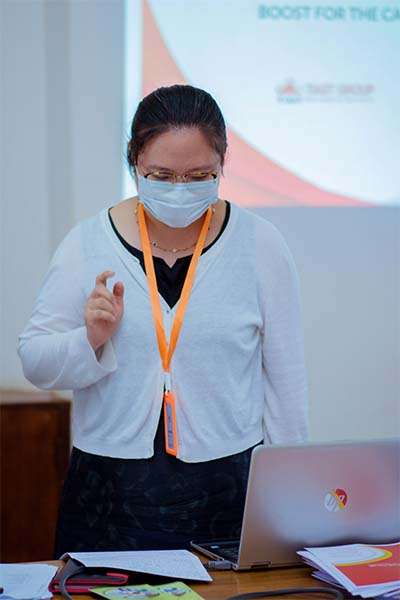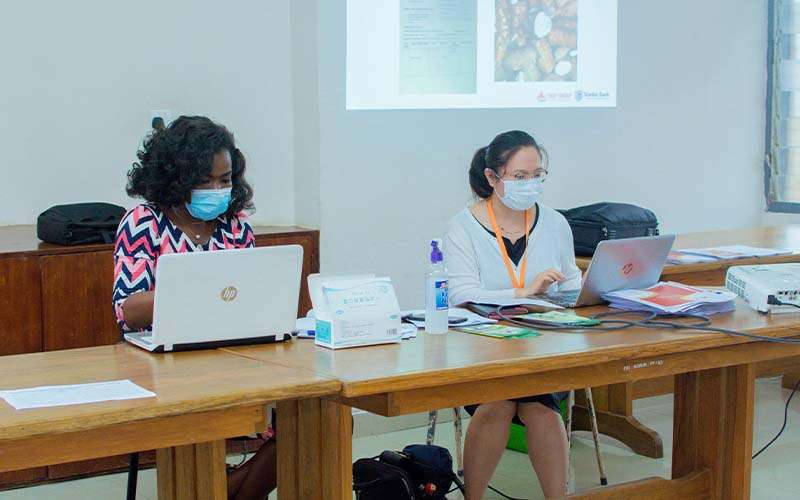- TIAST Group
- September 24, 2020
On Thursday, the 24th of September, 2020, TIAST Group was invited to join this year’s 28th meeting of the Ghana industrial Cassava Stakeholders Platform (GICSP) which was held at the Apesewa Conference room CSIR- Food Research Institute, Tettey Quarshie, Accra at about 2pm.
The GICSP serves to promote business interests of all actors within the cassava industrial value chain for effective contribution to Ghana. It has a mandate and responsibility to facilitate and coordinate structured markets for its members, develop a public-private partnership, build capacities of members and engage in policy advocacy in the inclusion of cassava in manufactured products. TIAST Group was represented by the Chairperson, Madam Lisa Hao and the Head of Commercial Banking of Stanbic Bank Mr. Abdul-Jaleel Hussein.
Miss Lisa Hao stated in her speech that as a basic raw material, cassava starch is widely used in food, medicine, paper making, textile, oil drilling, building materials, feed and other fields. According to her, at present 2000 kinds of starch-based products in the world. She stated that the demand of starch in the Chinese market is almost 3million pounds and the trends of increasing year after year.
“However, it is a pity that the area where cassava is grown in China is very limited and the yield is far lower than that in Africa”, she said. She added “where I was in Central region, cassava growers dug a fresh cassava growing for 10 months on the spot, and one plant had more than 10 fresh cassava fruits, it’s amazing weighing 20 kilograms. Such a high yield is really admirable”.
Furthermore, Madam Lisa added that in Ghana cassava can be grown all year round, regardless of the season, that means we can make a lot of money in the international market by processing it. “You know fresh cassava, processed into native starch or HQCF, selling price will increase about 10 times than the fresh roots, 30 times if it’s for modified starch, and 35 times if for alcohol,” she noted while highlighting the importance of value addition. However, she says, Africa is not getting a good return on such valuable investment.


“Why? We found that sometimes, because of the shortage of consumables, customers have to tolerate low levels of production efficiency. In some cases, due to the shortage of spare parts, when it’s damaged, even it just worth GH50 it may cause the entire production line to be shut down for a long time. And when it is shutdown, the customer has to wait for a month or two, let foreign engineers to check and repair because of less skilled, trained technical engineers here. It’s even more unfortunate, the service life of equipment is only about 1/3 of the design service life because there is no standardized technical service to maintenance equipment regularly,” she said.
In addition to equipment, African customers need more localized supply of consumables and spare parts, localized service of installation, commissioning and regular maintenance of equipment, and standardized service for technical personnel training, she said. Based on these characteristics and Ghana as the centre of West Africa, we have designed the “One seed, two Bridges, three cradles” development strategy for Cassava industry, according to her.
“If we only rely on buying equipment from other countries to processing cassava, without our Machinery Factory, any losses will be incurred in the installation and commissioning of the Machinery, spare parts and other after-sale services. Therefore, we are building equipment factories at DAWA to ensure equipment manufacturing, localization of spare parts supply and standardization of technical services. This factory is a seed for the development of cassava industrial chain. At the same time, we also set up 2 bridges for technical research and investment. In addition, we set up 3 cradles for talent training, including cassava cultivation, processing technical services and international trading practice,” she indicated.
Cassava processing is an important part of the industrial chain, she said, adding that it can expand production capacity, and encourage more farmers to plant cassava, more raw material supply of cassava, at the same time also will further promote the expansion of production capacity, to have pricing power in international market, in order to take advantage in the international market competition, get considerable gains. Agriculture is the foundation of Africa’s economic development, and there are a lot of young people, and we believe that in the field of cassava processing, with our financial and technical support, more young people will be able to get skills training and find jobs, and the value of that is unlimited. So, let’s make more for Agriculture together, she assured.
Making the event an interactive one, the head of commercial banking of Stanbic bank, Mr. Abdul Jaleel Hussein, answered questions that were thrown concerning the recent collaboration between Stanbic bank and TIAST Group. Into details, he explained how the cooperation will help cassava farmers and investors, which in turn, boost the development of the cassava industry in Ghana.
- Tags:
- GICSP
- TIAST Group

